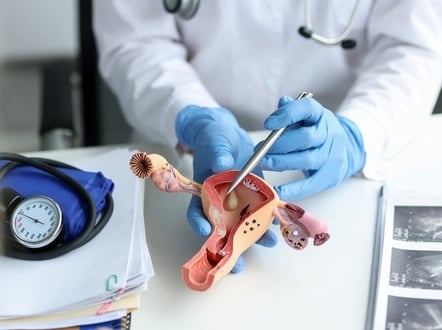Treatment for Endometrial Cancer
How do doctors decide on a treatment plan?
Doctors base treatment recommendations for endometrial cancer on several factors, including:
- Stage of cancer
- Subtype based on pathology
- Additional testing, including biomarkers and other tests
- How fast the cancer is growing or how likely it is to spread
- Whether the cancer is newly-diagnosed or has recurred after one or more treatments
Make sure that you receive a copy of your cancer test results, including your pathology report and your stage. Ask your doctor to explain your diagnosis, test results and treatment options in terms that you can understand. This will allow you to work with your doctor to choose a treatment plan that is right for you.
Most endometrial cancer is treated with one or more of the following treatments. Every treatment has potential risks and side effects. Before any new treatment or surgery, make sure your healthcare team tells you about what to expect.
Surgery
During surgery, the uterus, cervix, both fallopian tubes and often the ovaries are removed. Sparing the ovaries may be safe for some stage I, premenopausal patients. Surgery may also include removal of lymph nodes to check for cancer cells. Many endometrial cancer patients may be able to have minimally invasive surgery, which uses small incisions and an instrument called a laparoscope to remove the cancer.
In the case of cancers that have spread into surrounding tissue, the surgeon may not be able to remove all the cancer with hysterectomy alone. In this case, they may do debulking surgery to remove as much of the cancer as is safely possible. Debulking surgery may be followed by one or more of the treatments listed below.
Get notified when updated information becomes available.
SIGN UP FOR CONTENT UPDATESStudy : Immunotherapy improves outcomes of advanced endometrial cancer
Standard treatment for advanced endometrial cancer may soon change. A study found that people with advanced or recurrent endometrial cancer who received immunotherapy with chemotherapy had better outcomes than those who had chemotherapy alone. (Posted...
Radiation therapy
Radiation therapy uses powerful energy beams, such as X-rays, to kill cancer cells. Doctors may recommend radiation therapy to reduce the risk of endometrial cancer coming back after surgery (also known as recurrence). Sometimes, radiation therapy is recommended before surgery or instead of surgery. There are two types of radiation therapies used to treat endometrial cancer:
- External beam radiation is delivered from a machine outside your body. During external beam radiation, patients lie on a table while a machine directs radiation to specific points on the body.
- Internal radiation (brachytherapy) involves placing radiation in small seeds, wires or a cylinder inside the vagina for a short period of time.
Chemotherapy
Treatment for endometrial cancer usually includes a combination of chemotherapy drugs. The most common chemotherapy agents used to treat endometrial cancer include:
- Carboplatin
- Paclitaxel (Taxol)
These two agents are often used together. In some cases, a targeted therapy known as Herceptin (trastuzumab) may be added. These medications are typically given through the IV or a port as an outpatient.
Immunotherapy
Immunotherapies are cancer treatments that help the body’s immune system detect and attack cancer cells. The most common types of immunotherapy used for endometrial cancer are immune checkpoint inhibitors.
Immune checkpoint inhibitors
Immune checkpoint inhibitors are a type of immunotherapy used to treat several types of cancer, including endometrial cancer. Some cancer cells can switch off the immune system. Immune checkpoint inhibitors are drugs that prevent this from happening. This allows the immune system to find, unmask and destroy cancer cells.
Which immunotherapies are used for endometrial cancer?
Immune checkpoint inhibitors are used in the advanced or metastatic setting, most often to treat cancers that have biomarkers known as MSI-H or dMMR. People with Lynch syndrome often develop cancers with these biomarkers. The immunotherapies used in endometrial cancer include:
- Imfinzi (durvalumab) is used in combination with chemotherapy followed by Imfinzi alone as first line treatment for advanced or recurrent dMMR endometrial cancer.
- Jemperli (dostarlimab) is used in combination with chemotherapy followed by Jemperli alone as first line treatment for advanced or recurrent endometrial cancer. Jemperli may be used in this setting regardless of MSI/MMR status.
- Jemperli is used alone to treat MSI-H or dMMR advanced or recurrent endometrial cancer, which came back or got worse after platinum chemotherapy.
- Keytruda is used alone to treat MSI-H or dMMR advanced or recurrent endometrial cancer, in people whose cancer came back or got worse after previous treatment and who are not candidates for curative surgery or radiation.
- Keytruda is used alone to treat advanced cancers with the biomarker tumor mutational burden-High (TMB-H) that have progressed after treatment and for which there are no other treatment options.
- Keytruda (pembrolizumab) is used to in combination with the targeted drug lenvatinib in women with advanced endometrial cancers that are not dMMR or MSI-H, usually after other treatments have been tried.
Targeted therapy
Targeted therapies are treatments designed to attack or kill cancer cells, while sparing normal cells as much as possible. These therapies are often designed to target abnormal proteins, receptors or genes that are found in high quantities in cancer cells or the surrounding tissue. Tumor biomarker testing can help doctors identify the patients most likely to benefit from a targeted therapy.
Which targeted therapies are used for endometrial cancer?
Targeted therapy is still fairly new in the treatment of endometrial cancer. Currently, these agents are only prescribed if the cancer has recurred or as part of a clinical trial. Targeted therapies for endometrial cancer include:
- Vitrakvi (larotrectinib) is approved for treatment of endometrial cancer that is metastatic or cannot be removed with surgery and has worsened with other treatments. It targets a specific genetic change called an NTRK fusion. This type of genetic change is found in a range of cancers, including a rare type of uterine cancer known as uterine sarcoma.
- Lenvima (lenvatinib) helps block tumors from forming new blood vessels. Lenvima can be used along with the immunotherapy drug Keytruda to treat some advanced endometrial cancers, typically after at least one other drug treatment has been tried.
- Afinitor (everolimus) is a type of targeted therapy known as an mTOR inhibitor that has been used (off label) to treat some people with advanced endometrial cancer. Afinitor does not have FDA approval for use in endometrial cancer.
- Avastin (bevacizumab) helps block tumors from forming new blood vessels. Avastin does not have FDA approval for use in endometrial cancer.
- Enhertu (trastuzumab deruxtecan) is a type of targeted therapy approved for treatment many different types of advanced cancers (including endometrial cancer) if tumor testing shows a biomarker called HER2-positive.
Speak with your doctor if you have advanced endometrial cancer and you are not sure if you had biomarker testing, or if you don't understand your test results.
Researchers are studying new ways to use targeted therapies to treat endometrial cancer. Visit our Featured Research section for more information.
|
Name of Drug |
Cancer Stage |
Indication |
Biomarker |
Type of Agent |
|
Imfinzi (durvalumab) |
Recurrent or advanced endometrial cancer |
In combination with chemotherapy, followed by Imfinzi alone to treat primary advanced or recurrent endometrial cancer |
Mismatch Repair Deficiency (dMMR or MMR-D) |
Immune checkpoint inhibitor |
|
Jemperli (dostarlimab) |
Recurrent or advanced endometrial cancer |
In combination with chemotherapy, followed by Jemperli alone to treat primary advanced or recurrent endometrial cancer |
No biomarker required |
Immune checkpoint inhibitor |
|
Jemperli (dostarlimab) |
Recurrent or advanced endometrial cancer |
For treatment of recurrent or advanced endometrial cancer that is mismatch repair deficient (dMMR) that has progressed on or following a prior platinum-containing regimen |
Mismatch Repair Deficiency (dMMR or MMR-D) |
Immune checkpoint inhibitor |
|
Keytruda (pembrolizumab) |
Advanced endometrial cancer |
For the treatment of MSI-H or dMMR advanced or recurrent endometrial cancer that came back or got worse after previous treatment and for which there are no other treatment options |
Microsatellite Instability High (MSI-H) or Mismatch Repair Deficiency (dMMR or MMR-D) |
Immune checkpoint inhibitor |
|
Keytruda (pembrolizumab) |
Metastatic or unresectable solid tumors |
For the treatment of solid tumors that have progressed after treatment and for which there are no other treatment options |
Tumor Mutational Burden High (TMB-H) |
Immune checkpoint inhibitor |
|
Keytruda (pembrolizumab) |
Advanced endometrial cancer |
Combined with Lenvima (lenvatinib) for patients whose cancer has progressed after treatment and who are not candidates for surgery or radiation |
Tumors that are not MSI-H or dMMR (or MMR-D) - they may be referred to as MSI-Low, MSS, pMMR or MMR-P). |
Immune checkpoint inhibitor |
|
Lenvima (lenvatinib) |
Advanced endometrial cancer |
Combined with pembrolizumab, for the treatment of patients whose cancer has progressed after treatment and who are not candidates for surgery or radiation |
Tumors that are not MSI-H or dMMR (or MMR-D) - they may be referred to as MSI-Low, MSS, pMMR or MMR-P). |
Targeted therapy known as a tyrosine kinase inhibitor |
|
Enhertu (fam-trastuzumab-deruxtecan-nxki) |
Metastatic or unresectable solid tumors |
For adult patients with unresectable or metastatic, HER2-positive solid tumors (including endometrial cancer) who have received prior systemic treatment and have no alternative treatment options |
HER2 overexpression (HER2-positive) |
Antibody-drug conjugate (chemotherapy attached to antibody targeting HER2 receptor) |
|
Vitrakvi (larotrectinib) |
Metastatic solid tumors |
For treatment in metastatic solid tumors for which there are no other treatment options |
NTRK fusion |
Targeted therapy known as a kinase inhibitor |
Treatment by stage
Treatment regimens differ by stage.
- Stage 1 cancers are typically treated with surgery. Some patients may also receive radiation or chemotherapy. Hormone therapy may be given to patients who have additional medical problems which prevent surgery.
- Stage 2 cancers are typically treated with surgery and radiation. Some patients may also receive chemotherapy.
- Stage 3 and stage 4 endometrial cancers are treated with surgery. Most patients will also receive chemotherapy. Radiation may have benefit for some patients with advanced cancer. Tumor biomarker testing can help guide decisions about targeted therapy and immunotherapy.
Treatment side effects
Your healthcare team should explain what you should expect from all treatments, including:
- all of the possible risks and side effects of each treatment.
- which side effects may be serious and how to tell.
- when and who you should call if you experience a side effect.
- what can be done to treat or alleviate each side effect.
Make sure you let your healthcare team know if you experience any side effects of your treatment. For more information about possible treatment side effects, see our section on Cancer Treatment by Treatment Type.
Stages & Subtypes
Treatment for endometrial cancer depends on the stage and type based on pathology results. Learn how doctors determine the stage and subtype of endometrial cancers.
Biomarker Testing
Tumor biomarker testing and genetic testing can provide additional clues about which treatments may work best against your cancer.
Genetic Testing for Inherited Mutations
There are national guidelines that outline who should consider genetic counseling and testing for an inherited mutation linked to cancer.
Participate in Endometrial Cancer Treatment Research
Below are some of our featured research studies looking at new treatments for endometrial cancer treatment. To search for more studies, visit our Search and Enroll Tool.
Clinicaltrials.gov identifier: NCT04008797
Clinicaltrials.gov identifier: NCT06167317
New Treatment in People with Triple Negative Breast Cancer or Advanced Solid Tumors
Clinicaltrials.gov identifier: NCT06022029
A Study of Targeted Therapies for Patients With Recurrent Endometrial Cancer
Clinicaltrials.gov identifier: NCT04486352






